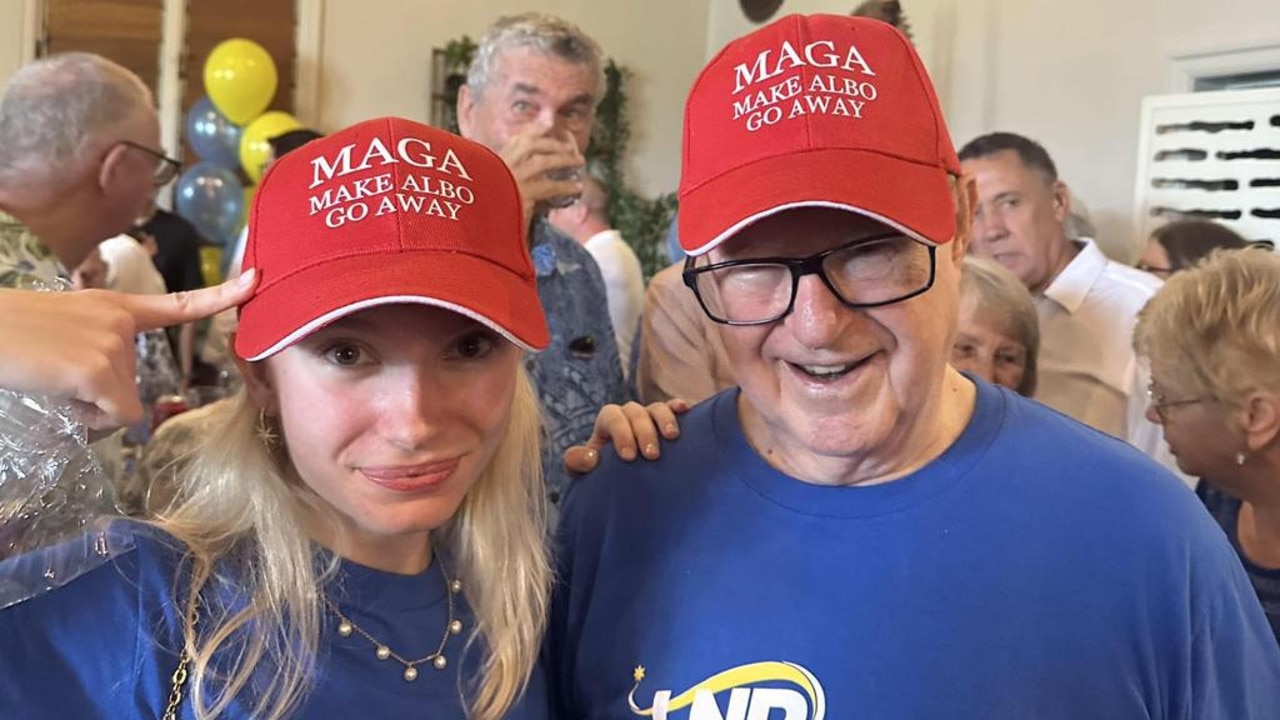Power Brokers of Canberra’s Corridors: Top guns in sport, defence, health, education, religion and more
Aside from politics, Australia’s defence industry, sporting world and the Church has top guns who wield enormous influence in Canberra’s corridors. SEE THE FULL LIST
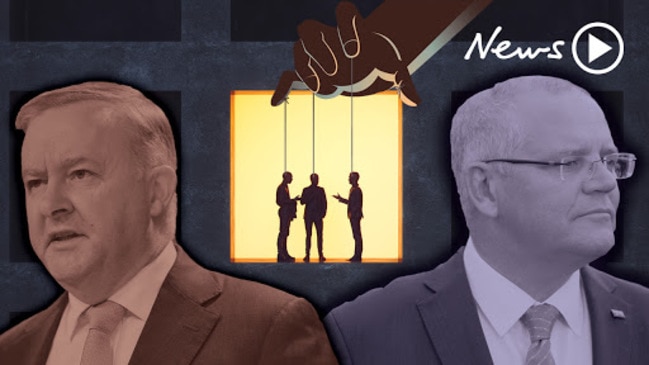
National
Don't miss out on the headlines from National. Followed categories will be added to My News.
Governments come and go but behind the scenes are players pulling the strings and wielding influence unseen by the public.
In 2019, there has been a seismic shift in the landscape of Australia’s power players, brought on by an explosive banking royal commission, a leadership spill, a shock federal election result and a foreign influence crackdown.
Today, News Corp shines a light on who is big behind the scenes and how they operate to influence our daily lives.
The Power Brokers list includes 100 of the country’s most influential people in business, defence, health, the public service, politics and a raft of other fields.
It includes billionaires or business figures with extensive political contacts and influence such as Australia’s richest man Anthony Pratt and Andrew Forrest.
It also includes Prime Minister Scott Morrison’s closest advisors, the lobbyists who represent powerful interest groups or corporations, the groups that wine and dine politicians with gifts or tickets to sporting events and some of the country’s biggest political donors.
The list was compiled by scouring politicians’ interest registers, the Australian Electoral Commission’s annual political donations disclosures, the lobbyist register and speaking to politicians, bureaucrats and Canberra watchers to compile the list.
Other individuals were selected for the influence they wield in other ways, such as former politicians, domestic violence campaigner Rosie Batty, AFL chief Gillon McLachlan or Donald Trump’s man in Canberra Arthur Culvahouse.
TOP GUNS: Other influential Aussies in defence, health, politics, education, the Church and more
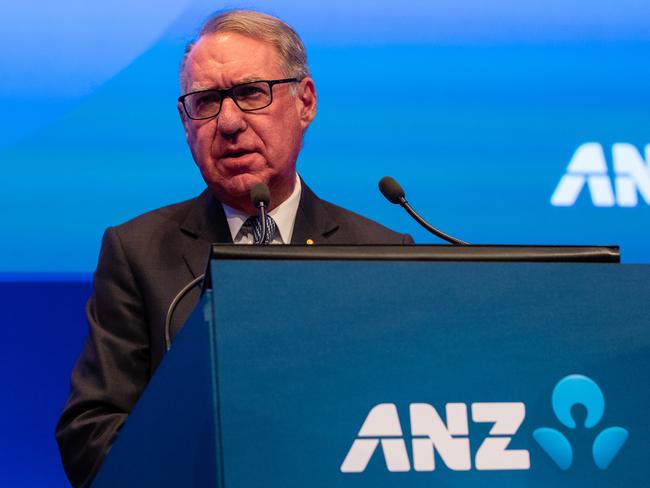
David Gonski
David Gonski’s influence over how Australian schools are funded cannot be understated.
He must also be one of the few people in Australia who knows what it’s like for Indian billionaire Gautum Adani to have his name become a political firestorm.
The high-profile businessman’s education review, commissioned by the Rudd Government in 2010, ultimately sparked a major overhaul of school funding in Australia.
But his name was hijacked by political parties for years to attack each other over federal education funding.
Labor’s massive ‘I Give A Gonski’ campaign was only short-circuited by Malcolm Turnbull in 2017 when, standing beside David Gonski himself, the then-PM announced he would launch a ‘Gonski 2.0’ review and push the original funding reforms through Parliament.
Gonski has since gone back to quietly being “the chairman of everything”, including ANZ and Coca-Cola Amatil. He is also the Chancellor of the University of NSW.
He has been an advisor and friend to some of the nation’s most powerful people, including Kerry Packer, Frank Lowy and Rupert Murdoch.
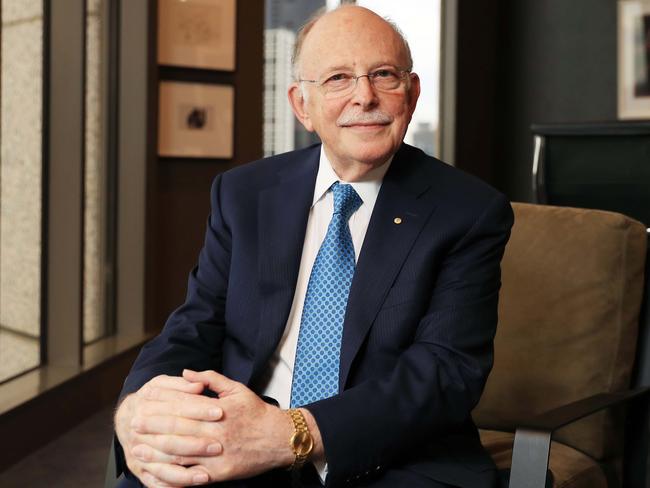
Mark Leibler
Mark Leibler is the senior partner of one of Australia’s most prominent law firms and is a powerful voice for the nation’s Jewish community.
Leibler has had close ties with some of the nation’s most powerful people in politics and business for decades through his work and social activism, and has sat on major boards including Coles Myer and Reconciliation Australia.
He was named one of the 50 most influential Jews in the world by the Jerusalem Post in 2014.
In 2013, when his law firm Arnold Bloch Leibler celebrated its 60th anniversary, then-Prime Minister Tony Abbott was the guest of honour, along with Opposition leader Bill Shorten, Speaker Bronwyn Bishop and the Ambassadors of Israel and Turkey.
Leibler is also national chairman of the Australia/Israel and Jewish Affairs Council, the peak body representing the country’s Jewish community which sponsors regular study trips to Israel for federal MPs as part of its lobbyist role.
Arnold Bloch Leibler has also been a political donor in recent years, giving $16,000 to Labor in 2015-16 and $61,000 to the Liberal Party the same year.
The firm also provided pro-bono legal advice to politicians over citizenship in 2017 and 2018, including Julia Banks, Bill Shorten, and Arthur Sinodinos.

Leon Zwier
Leon Zwier – known as “Mr Fix-It” in corporate Australia – is connected to some of the country’s most powerful people, including billionaires and political leaders.
The Melbourne-based lawyer was a close adviser to Bill Shorten, and even rated a shout out in the ex-Labor leader’s concession speech on election night.
He represented Shorten pro bono in the 2015 royal commission into trade unions.
The Arnold Bloch Leibler partner was also integral in Victorian Premier Daniel Andrews’s bid to get out of the East West Link contract, and has represented a strong of powerful figures including late billionaire packaging magnate Richard Pratt.
Zwier also holds influential roles with Cricket Australia and the Law Council of Australia.
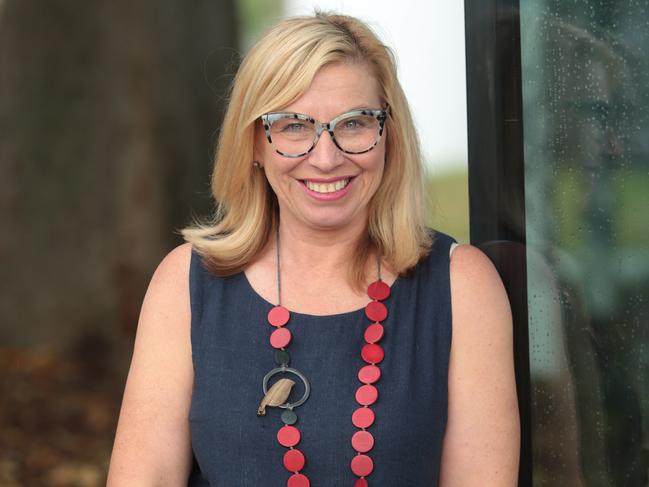
Rosie Batty
Former Australian of the Year Rosie Batty stepped back from the public eye this year but remains an influential voice on family violence in Australia.
Batty has shone a spotlight on family violence since her 11-year-old son Luke was murdered by his father Greg Anderson at cricket practice in February, 2014.
This year, she announced the Luke Batty Foundation would be closing to allow her to take a step back after an amazing but “gruelling” and “bittersweet journey”.
Her tireless advocacy prompted Malcolm Turnbull to commit $100 million to fight domestic violence in 2015, while his successor Scott Morrison committed another $328 million in March this year.
Batty was appointed an Officer of the Order of Australia in the Queen’s Birthday honours in June and took a position on the board of Melbourne’s Royal Women’s Hospital the same month.

Deborra-lee Furness
Most Australians would know Deborra-Lee Furness and Hugh Jackman as a Hollywood power couple.
But Furness is also a leading figure pushing for adoption law reform in Australia.
The Aussie actress, who founded advocacy group Adopt Change more than a decade ago, has used her star power and connections to put a spotlight on the issue with political leaders such as Tony Abbott, Julie Bishop and former NSW Premier Mike Baird.
Abbott consulted Furness and Jackman, who have two adopted children, during his 2013 push to make overseas adoptions easier for Australians.
Adopt Change was then a major voice to a parliamentary inquiry in 2018 which ultimately recommended Scott Morrison’s government pursue a national law on adoption with state governments to tackle the skyrocketing rate of children in child protection.
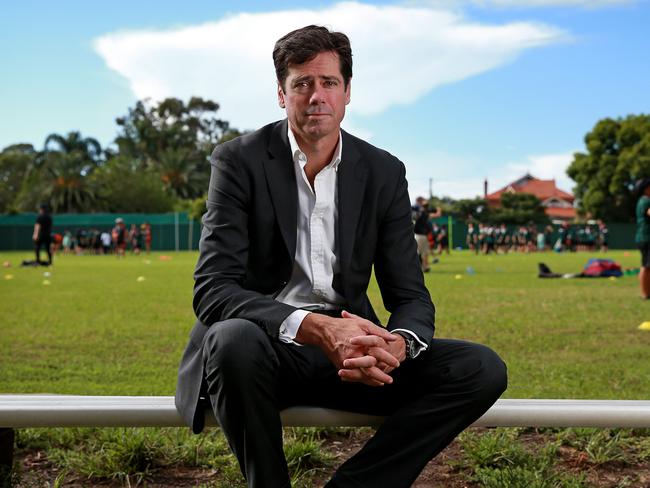
Gillon McLachlan
AFL boss Gil McLachlan is one of the most powerful men in Australian sport as chief executive of one of the country’s most popular sporting codes.
He has overseen major changes including the launch of the AFL’s women’s league, and is incredibly influential when speaking out on issues from stadium security crackdowns on fan behaviour to the treatment of retired Sydney star Adam Goodes.
But McLachlan also demonstrated the pull he has with political leaders after the so-called “au pairs” scandal that embroiled Home Affairs Minister Peter Dutton last year.
During the saga, which exploded just weeks after Dutton’s failed leadership challenge, it emerged McLachlan helped stop an au pair who was going to stay with his second cousin Callum MacLachlan’s family from being deported.
The AFL boss had asked the AFL’s Government relations officer Judith Donnelly to contact the then-Immigration Minister’s office about the case and just hours later, Mr Dutton personally intervened to overturn the deportation.
During questioning at a Senate inquiry into the matter, McLachlan also revealed he had asked Donnelly to inquire about the visa status of a second person – an Argentinian polo player who was a “friend of a friend” – on another occasion when Scott Morrison was Immigration Minister.
Donnelly, a former Tony Abbott staffer, had contacted someone she knew in the then-prime minister’s office about it and heard back “within a couple of days” that it had been processed. The AFL also regularly invites federal MPs to football games, including Julie Bishop, Simon Birmingham, Linda Burney, Mark Butler, Bill Shorten, Josh Frydenberg, Greg Hunt and Scott Morrison.
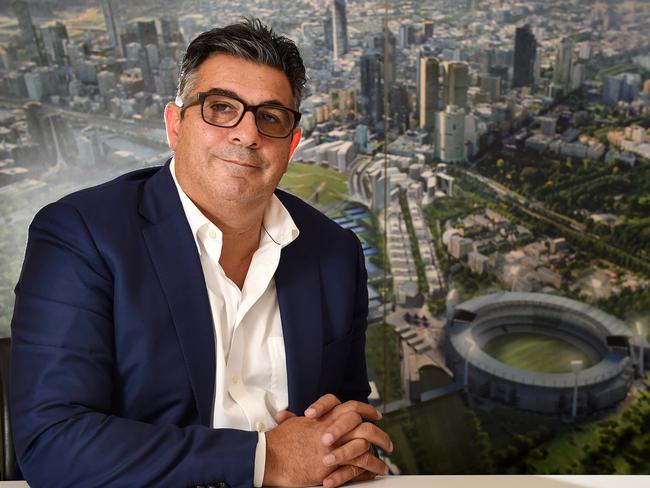
Andrew Demetriou
Andrew Demetriou was one of the most powerful people in Australian sport for more than a decade as head of the AFL.
He drove a massive expansion, adding two new teams to the league and turning it into big business.
The league’s revenue more than doubled over his 11-year term to more than $450 million.
Demetriou left the AFL in 2014 but has remained a highly influential figure, including on the board of James Packer’s Crown Resorts
The casino giant is one of Australia’s biggest political donors, contributing millions to the major parties.
It gave almost $75,000 to Labor, more than $90,000 to the Liberals, and more than $8000 to Nationals in 2017-18 alone.
Demetriou sites on the board with other highly influential Australians including, former Qantas and Tourism Australia boss Geoff Dixon, advertising giant Harold Mitchell, former senator Helen Coonan and former senior bureaucrat Jane Halton.
He sits on another of boards, including Capitol Health and dental company the Ruthinium Group. He was also chairman of the Australian Multicultural Advisory Council.
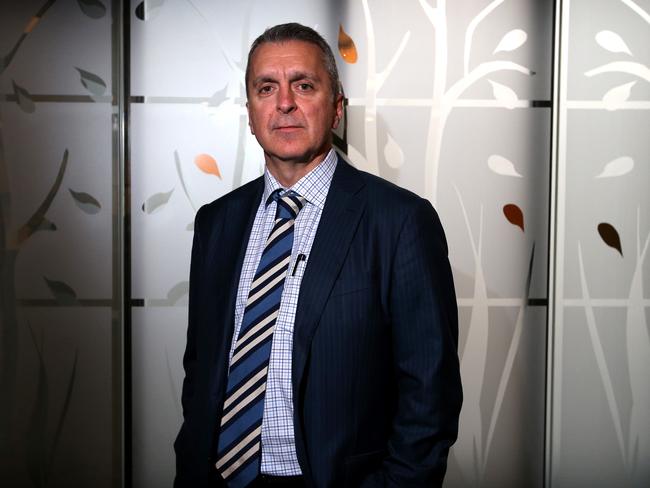
George Tambassis
George Tambassis heads up one of the most powerful lobby groups in the country, the Pharmacy Guild of Australia.
‘El presidente’, as he reportedly calls himself, has been head of the influential group for almost six years.
This year, the Guild was able to successfully convince the federal government to dump a plan ahead of the federal budget that would have saved patients up to $240 a year on the cost of their prescription medicines but would have impacted chemists’ profits.
It has long been one of the most effective lobby groups in Canberra, having negotiated big wins such as a ban on new chemists opening closer than 1.5 kilometres from existing pharmacies and a policy which prevents supermarkets from selling prescription medicines.
And with more than 5700 pharmacists as members spread across every electorate in the country who have daily contact with constituents, especially older Australians, federal MPs are hesitant to oppose them.
Well-connected former Liberal staffer David Quilty was also a key figure at the Pharmacy Guild until he stepped down as executive director in May.
Quilty is now managing director of government relations firm National Advisory, chaired by his old boss, former Liberal minister Richard Alston.
The Pharmacy Guild became a major political donor during Tambassis and Quilty’s tenure, contributing almost $1 million over five years to the country’s biggest political parties.
Its latest donations ahead of the 2019 election won’t be revealed until next year, under the Australian Electoral Commission’s current disclosure regime.
The Pharmacy Guild also employs a number of extremely well-connected external lobbyists, including Hawker Britton, a Labor-aligned firm headed veteran Labor media strategists Eamonn Fitzpatrick and Simon Banks, long-time Canberra lobbyist Jannette Cotterell, and former Liberal minister Santo Santoro.

Michael Siddle
Michael Siddle is chairman of Ramsay Health Care, one of Australia’s biggest political donors.
The company, which operates dozens of private hospitals and pharmacies across the country, has contributed hundreds of thousands of dollars to Liberal Party coffers since 1998, including $106,000 in 2015-16.
The company’s founder, Paul Ramsay, was a big Liberal donor and it still has strong links to the party.
Siddle has also made significant personal donations to political parties.
He gave $10,000 to the federal Liberal Party in 2018 – a relatively minor sum for a company to give but is considerable for an individual.
Siddle also gave $7500 to the Nationals in 2017.
He sits on the board of the Paul Ramsay Foundation along with businessman Tony Clark, who is close with Tony Abbott, and Kathryn Greiner, who is married to but separated from current Liberal Party president Nick Greiner.
Ramsay Health Care or Siddle’s donations immediately leading up to the 2019 federal election won’t be revealed until next year, under current Australian Electoral Commission rules.
But in 2017-18 the company splashed out $55,000 on a donation to the Labor Party, $10,850 to the Nationals and gave nothing to the Liberal Party.

Colin Goldschmidt
The power of Australia’s pathologists became clear when the federal government flagged it would slash bulk billing incentives on blood tests and other pathology in late 2015.
A massive ‘don’t kill bulk bill’ campaign was organised by the industry and peak lobby group Pathology Australia ahead of the 2016 election. It mobilised hundreds of thousands of Australians to sign a petition arguing against the move.
Malcolm Turnbull – who was simultaneously being forced to counter Labor’s Medicare campaign – agreed to an 11th hour peace deal with the industry, which would cut the rents pathologists paid to doctors for co-locating their surgeries.
The government reneged on the rent deal after the election after protests form GP groups.
Labor revived the blood test battleground during the 2019 election campaign - with Bill Shorten pledging $200 million to “protect pathology” and keep tests free for cancer patients and older Australians - although it caused less of a splash this time.
Colin Goldschmidt heads up Australia’s biggest pathology provider, Sonic Healthcare, which has been a big political donor in recent years. Sonic gave Labor $55,000 in May 2016 ahead of election and the Liberal Party $50,000 in June 2016. It gave more than $250,000 to various branches of the Liberal Party in 2013-14, and $200,000 to the Liberals in 2010.
Pathology Australia has also donated thousands to political parties.
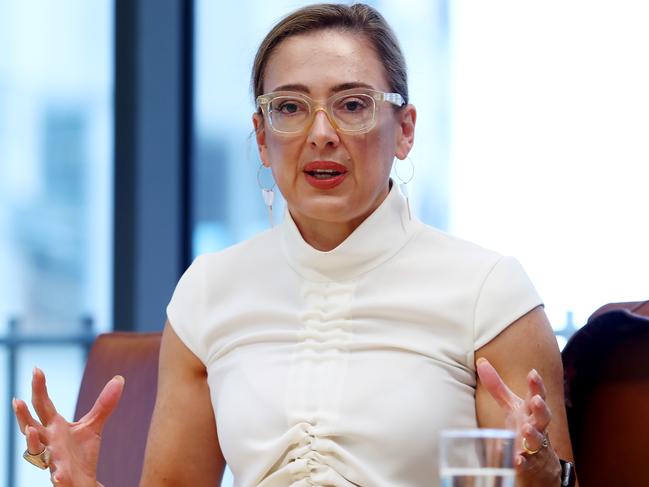
Rachel David
Rachel David is the top lobbyist for Australia’s private health insurance industry.
The former Liberal staffer – who worked as a senior adviser for Howard era Health Minister Michael Wooldridge - has been the public face of the powerful industry and its voice to Canberra for the past four years.
She’s previously worked for vaccine manufacturer CSL and medical device giant Johnson and Johnson and has close connections with Liberal party identities.
She’s the chief executive of Private Healthcare Australia, the body representing 96 per cent of the health insurance industry.
David was instrumental in working with the industry and government when it introduced new gold, silver, bronze and basic private health insurance packages this year and she drove down health fund payments to medical device companies by $1 billion.
Under the gold, silver, bronze and basic policy, designed to simplify cover, some health funds have cut benefits for members.
David was also outspoken on Labor’s plan to cap annual premium increases at 2 per cent in the lead up to the 2019 election.
A new review into private health insurance was announced by Health Minister Greg Hunt in July, which will look at ways to reduce health insurance costs.
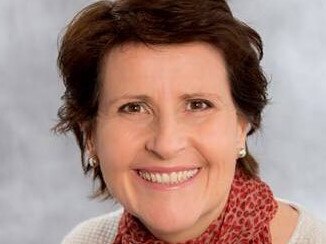
Elizabeth De Somer
Medicines Australia is one of the country’s biggest political donors.
Individual companies like Pfizer also donate to political parties but Medicines Australia – the industry’s peak body - has been a regular donor for years.
In 2017-18, it contributed $89,500 to various Liberal Party branches, $67,140 to Labor and $21,125 to the Nationals.
Elizabeth De Somer is the new face of Medicines Australia, after becoming the organisation’s first female chief executive in 2018.
But she has long held a behind-the-scenes role as one of the group’s key voices to Canberra for more than a decade in various positions.
De Somer was instrumental in negotiating a five year agreement with the government in 2017, which saw the government slash $1.8 billion from the pharmaceutical benefits scheme but also promise to halve the average number of submissions companies have to make to a government committee before they receive a subsidy.
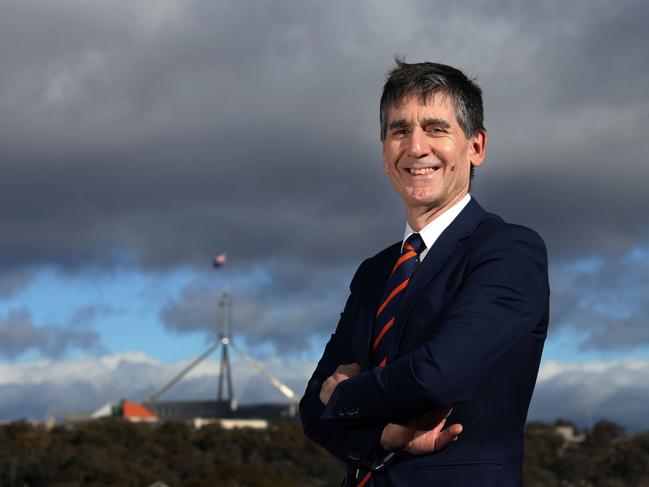
Tony Bartone
Tony Bartone is one of Australia’s most influential voices on health as the current head of the Australian Medical Association.
The Melbourne GP has been a strong supporter of the digital My Health Record but was one of the key figures to put pressure on Health Minister Greg Hunt to extend the opt-out period and introduce stronger privacy provisions late last year.
Bartone regularly meets with federal ministers on health issues in his role, including with Home Affairs Minister Peter Dutton in July regarding the government’s push to repeal the controversial refugee medevac laws.
He was elected as the new AMA President in May 2018 for a two year term, replacing outspoken Western Australian obstetrician Michael Gannon in the role.
Former AMA presidents have gone on to enter politics, including Dr Brendan Nelson and Dr Kerryn Phelps.
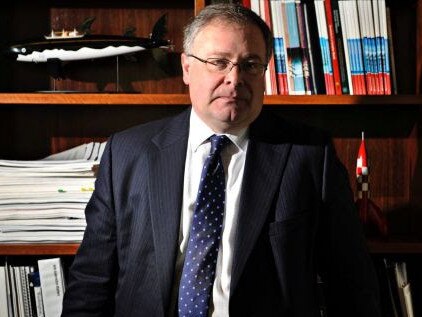
Peter Jennings
Peter Jennings is one of the country’s most influential experts on defence and national security policy.
He has led national security think tank, the Australian Strategic Policy Institute, in Canberra since 2012.
Before that, Jennings held senior roles in the Defence Department, and was an adviser to John Howard on strategic policy and chief of staff to Howard era Defence Minister Ian McLachlan.
He has been called on to provide advice to government on multiple occasions, including on the Abbott Government’s landmark Defence White Paper.
Jennings is also regularly quoted in the media on national security, defence and international relations matters.
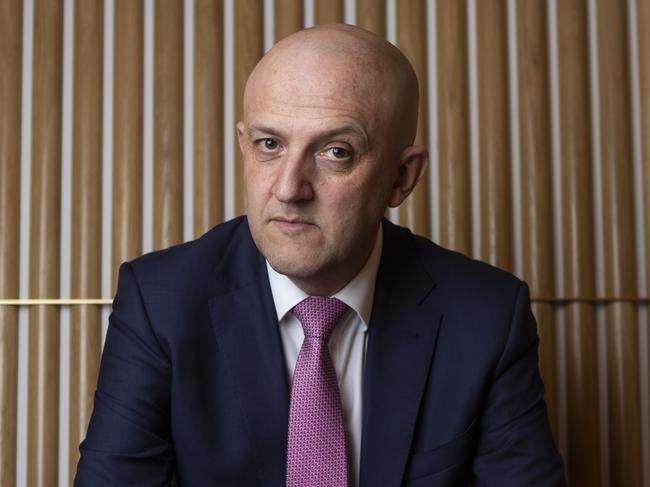
Mike Burgess
Mike Burgess is Australia’s top spook.
He was named the new head of the country’s spy agency, the Australian Security Intelligence Organisation, last month to replace outgoing ASIO boss Duncan Lewis.
The agency is responsible for gathering the intelligence which will protect the country from terrorist attacks, countering foreign espionage efforts and foreign influence in Australia.
It’s one of the nation’s most powerful and secretive roles, although Burgess will still represent the agency at public Senate estimates hearings in Parliament.
Before ASIO, Burgess headed up the nation’s cyber intelligence agency, the Australian Signals Directorate.
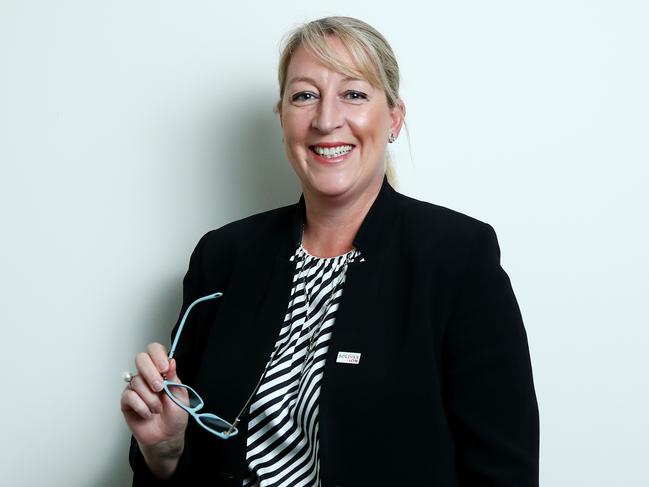
Gabrielle Costigan
Gabrielle Costigan heads up Australia’s biggest defence contractor.
The ex-Army Colonel took over the reins at BAE Systems in January 2018, just six months before it was awarded a $35 billion government contract to build nine anti-submarine warships.
The massive contract will take almost a decade and will produce Hunter Class warships the Navy says will have the “highest levels of lethality and deterrence” Australia’s troops will need in periods of global uncertainty.
The role with BAE makes Costigan one of the most influential people in the multi-billion dollar sector responsible for building the military infrastructure which will be used to defend Australia for decades to come.
Costigan has also worked with some of the most powerful people in the military and public life through her previous career in the Australian Army.
In 2008 and 2009, she worked as a military assistant to General David Hurley, who is now Governor-General of Australia.
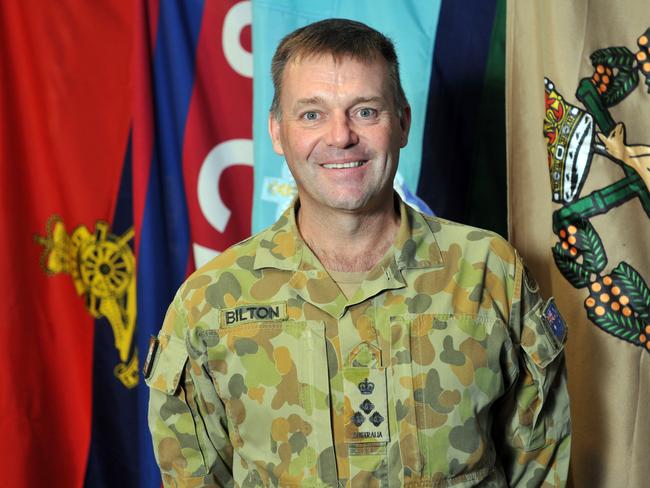
Lieutenant General Greg Bilton
Lieutenant General Greg Bilton has risen steadily through the ranks to occupy one of the most integral roles in the Australian defence force.
Bilton’s new role as Chief of Joint Operations makes him responsible for the planning, control and conduct of all of Australia’s military campaigns and operations, both internationally and domestically.
It comes after he previously held a high-ranking role embedded with the US Army’s Pacific Command in Hawaii.
The Lieutenant General, who grew up in Melbourne, is one of only two foreigners to have ever served as Deputy Commanding General to the US Army, Pacific – a role which saw even US personnel obeying his direction as needed.
It demonstrates the closeness of the Australia-US relationship.
It also gave Bilton ties with senior figures in the US military and experience in a leadership role in a Command with significantly more personnel than the ADF.
The only other foreigner ever to hold the role was Lieutenant General Rick Burr, who is now Australia’s Chief of Army.
Bilton took up his new role in June.
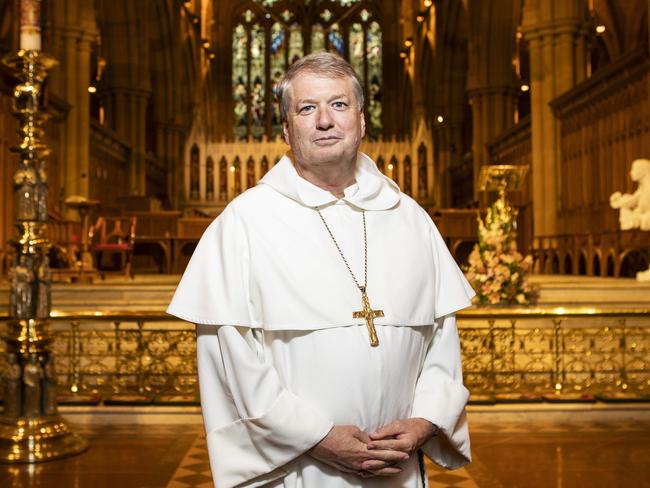
Archbishop of Sydney Anthony Fisher
Archbishop of Sydney Anthony Fisher is undeniably powerful as the Catholic Church’s most senior figure in NSW.
He is also partly responsible for the $4.6 billion in extra funding private schools secured from the federal government last year after the Catholic sector waged a campaign claiming Malcolm Turnbull’s Gonski reforms would leave them with a $1.1 billion funding shortfall.
Fisher took a leading role in negotiating the peace deal with the federal government.
He was one of three archbishops who met with Turnbull in July when the then-PM was trying to quell the Catholic sector backlash, particularly with a looming federal election.
Fisher was also a key figure in talks with Scott Morrison and Education Minister Dan Tehan following the leadership spill as they finalised a commitment for $4.6 billion in extra funding for Catholic and non-government schools.
As Archbishop, Fisher is also an influential voice when speaking out on issues such as same-sex marriage, the push for new religious discrimination laws, the Church’s response to survivors of child sex abuse and even the treatment of rugby star Israel Folau.

Archbishop of Melbourne Peter Comensoli
Dr Peter Comensoli was one of the most influential figures in the Catholic sector’s campaign on school funding - even before he became Archbishop of Melbourne.
Like Sydney Archbishop Anthony Fisher, he can claim partial credit for private schools scoring an extra $4.6 billion in extra funding from the federal government after the Catholic sector backlash to Malcolm Turnbull’s Gonski reforms.
Comensoli was chair of the NSW Catholic Education Commission before his current role and was outspoken in criticising the Coalition over a lack of consultation on the reforms.
Behind-the-scenes, he reportedly called then-Education Minister Simon Birmingham directly to express his anger when the funding changes were announced in 2017.
Comensoli was one of three archbishops invited to meet with Malcolm Turnbull in 2018 to discuss a resolution to the funding issue, although he was not yet Archbishop of Melbourne at the time.
He has been outspoken on other issues since taking on the post, including on religious freedoms.
Comensoli recently claimed he would be prepared to go to jail rather than report admissions of child sexual abuse made during confession, as the Victorian Government introduced legislation on the matter to state Parliament.
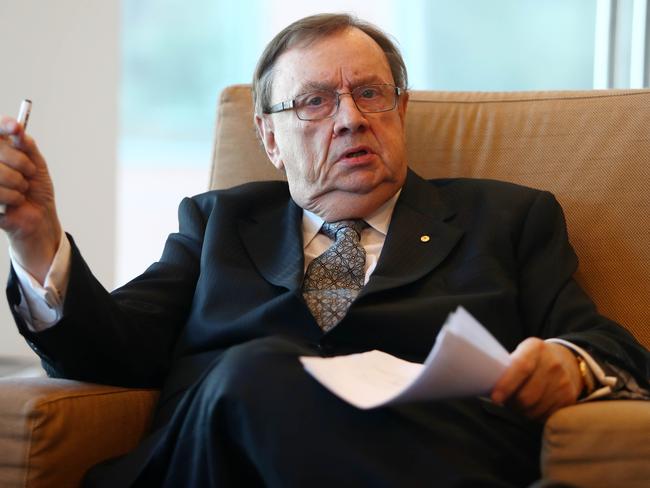
Harold Mitchell
Advertising mogul Harold Mitchell has poured hundreds of thousands of dollars into Australia’s major political parties’ coffers in the past decade.
He is also connected to powerful figures in politics, sport, business and media through his decades as a giant of the ad industry and his position on a number of boards.
Mitchell currently sits on the board of Crown Casino as a non-executive director alongside former NSW Senator Helen Coonan, former AFL boss Andrew Demetriou, former Qantas and Tourism Australia boss Geoff Dixon and former Health Department boss Jane Halton.
Aside from running ad agency Mitchell & Partners for almost 40 years, Mitchell has also been chairman of FreeTV Australia, the Melbourne Symphony Orchestra and a director of Tennis Australia.
In the past decade, he has donated $437,620 to the Liberal Party and $139,526 to Labor.
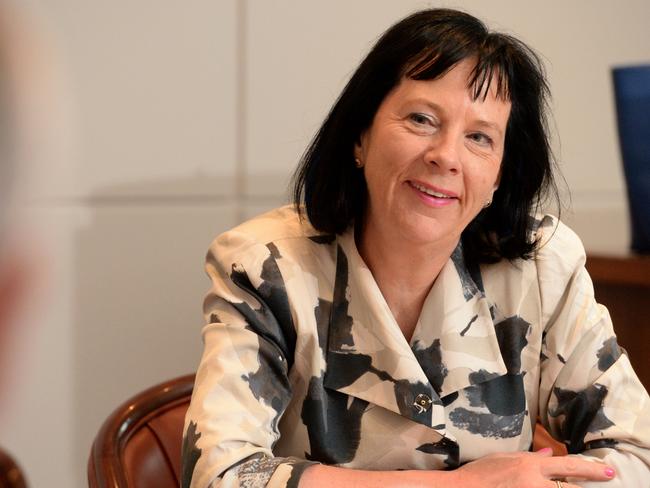
Janet Whiting
Janet Whiting is one of Australia’s top commercial litigators and sits on a string of high profile boards.
The Melbourne-based lawyer’s network includes some of the country’s most powerful people, and she has been influential in tourism, culture and the arts.
Whiting heads up prominent law firm Gilbert and Tobin’s litigation section, and is currently one of the solicitor’s representing the State of Victoria in the Lawyer X royal commission.
She is also representing advertising mogul and former Tennis Australia director Harold Mitchell in the civil penalty proceedings brought against him by the
Australian Securities and Investments Commission over Tennis Australia’s 2013 decision to grant the Seven Network broadcast rights without a competitive tender process.
Whiting previously held influential roles on the boards of Tourism Australia, the Melbourne Fashion Festival and Bell Shakespeare. Since 2010, she has also been a board member of the National Australia Day Council, which runs the Australia Day honours.
She is also president of the National Gallery of Victoria’s council of trustees.
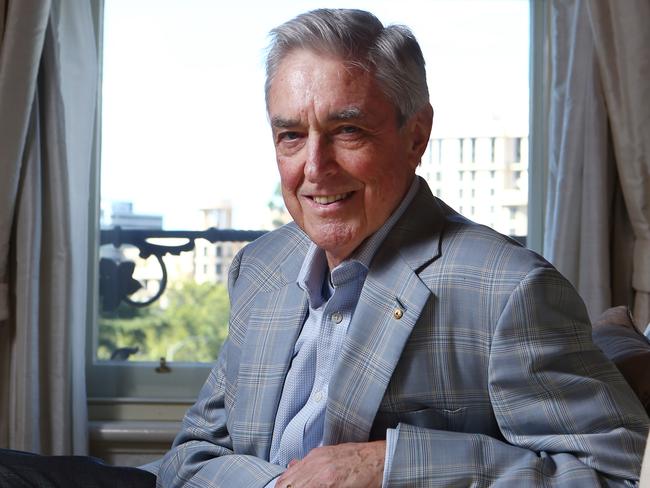
Phil Scanlan
Former diplomat and businessman Phil Scanlan has facilitated high level meetings between Australian politicians and American political leaders for almost three decades.
He founded the Australian American Leadership Dialogue in 1992, which has sponsored regular meetings in various cities for political leaders from both countries ever since to “help shape the direction of the bilateral relationship”.
Malcolm Turnbull, Tony Abbott, Bill Shorten and Kevin Rudd have all attended in past years.
It popularity has waned in recent years, with no senior Liberal MPs attending in the 45th Parliament.
But senior Labor figures Anthony Albanese, Richard Marles, Jim Chalmers and Jason Clare still attended various Australian American Leadership Dialogue events in Los Angeles, San Francisco, Honolulu or Brisbane from 2016 to 2018. Liberal MP Andrew Hastie also attended the event in Honolulu.
Scanlan was Australia’s Consul-General in New York from 2008 to 2013 and was an executive at Coca Cola Amatil in the late 80s and early 90s.

Gerard Henderson
Gerard Henderson has seen a who’s who of influential Australians come through his door and has facilitated public debate.
Gough Whitlam, John Howard, Julia Gillard, Joe Hockey, Malcolm Turnbull, Bill Shorten, Julie Bishop and Scott Morrison have all spoken at The Sydney Institute, which Henderson founded in 1989 as a forum for discussing big ideas.
Even Dick Cheney spoke at The Sydney Institute before he became US Vice President but after he served as Secretary of Defense.
Academics, authors, media figures, activists and others have also spoken at the institute in the past 30 years.
It has become one of the nation’s most prominent forums for public speeches and has put Henderson in contact with Australia’s most powerful people.
He is also a regular media commentator on Sky News and a columnist for The Australian.
Originally published as Power Brokers of Canberra’s Corridors: Top guns in sport, defence, health, education, religion and more

